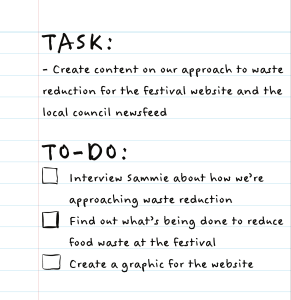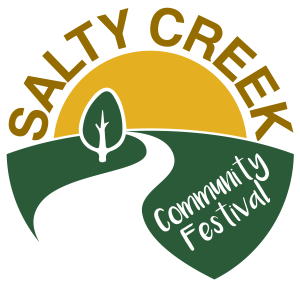Minimising festival waste with a systems thinking approach
The Salty Creek Community Festival planners are committed to running a sustainable festival, and minimising waste is a high priority. Check out the online content Bo creates to promote the festival’s sustainable approach to food waste management…
![]()
![]()
The Salty Creek Community Festival is a few weeks away, and the Budget and Marketing Advisor, Bo, is creating some digital material to advertise the festival and promote its sustainability focus.
Here is Bo’s to-do list:

Read Bo’s interview with one of the festival organisers, Sammie, to learn more about how they’re using a systems thinking approach to minimise waste at the festival.
![Spiske M (2016) Basket of Vegetables [photograph], Unsplash website, accessed 31 March 2023. https://unsplash.com/photos/ZKNsVqbRSPE](https://rmit.pressbooks.pub/app/uploads/sites/51/2023/03/markus-spiske-ZKNsVqbRSPE-unsplash-scaled-e1680220638354-1024x466.jpg)
From Farm to Table and Beyond: The Salty Creek Community Festival Wastes Not
Bo: Hi Sammie, thanks for taking the time to talk about running a sustainable festival. First, can you tell us your approach to minimising waste at the upcoming Salty Creek Community Festival?
Sammie: Absolutely! We’ve used a systems thinking approach to design a waste management system that promotes sustainable practices.
Can you explain what you mean by a systems thinking approach?
Sure. It basically means that we’re taking a big-picture view of the festival and thinking about all the different things that contribute to waste. So, rather than just focusing on one part of the process, like encouraging attendees to recycle their plates, we’re looking at the whole system – from start to finish – and seeing where we can make changes.
Can you give me an example of how this approach influenced your waste management plan for food waste? Sounds like it’s a lot more complicated than just organising composting.
Totally. If you investigate food waste as a system, there’s much more to it than just composting. There’s waste that happens along the entire journey of the food supply chain. Systems thinking can help organisers figure out why there’s often so much food waste at festivals and come up with solutions that address the problem at its source.
For example, not doing a proper estimate of the number of attendees can lead to too much food being ordered and produced. Poor management of the food while in transit or insufficient storage could result in food going off. These things contribute to waste, not just how attendees dispose of their leftovers. By thinking about the whole process, we can come up with solutions that tackle the root causes, like doing in-depth estimations of attendees and ensuring food storage is up to scratch before the event. Then, of course, there’s the composting [laughs].
That sounds like a really smart approach. What other strategies are you using to reduce waste when it comes to food?
We’re working with our food truck vendors to make sure that they’re sourcing their ingredients as sustainably as possible. We’re looking into how we can optimise food preparation, like pre-preparing ingredient portions to reduce the amount of food that might go to waste. And while there will be vegan and gluten-free food options, the trucks will have limited menus. We’re creating signage to encourage attendees to be mindful of food waste and providing compost and recycling bins. I’m also really pleased about the local connections we’ve made with farmers and charities who will be taking food scraps, compost, and leftover produce and using it to serve the community.
Wow, that’s really impressive!
Thanks! And that’s just a few examples of our waste management strategies.
Have you faced any challenges in implementing these strategies?
No major issues yet. I think the systems thinking approach has helped us identify potential roadblocks and come up with solutions before they’ve become problems. Raising awareness and educating stakeholders, staff, and volunteers has required a bit of extra effort, but overall people have been supportive. We’re really hoping our system will be able to stand as a model for future sustainable festivals.
Next on Bo’s to-do list is creating a graphic for the website about the festival’s food waste strategy. After chatting to Sammie and looking through the festival sustainability plan, Bo decides to make an interactive infographic for the website that will show the steps the festival organisers are taking to reduce waste at each stage of the food supply chain.
Check out the interactive infographic Bo has created for the website. Select the ‘+’ icon to read more detail about what is being done to reduce waste at each stage.
Interactive infographic transcript
Reflect
Could you use a systems thinking approach to reduce waste and live more sustainably?
Expand the stages below to read some reflection questions about the food you buy, consume, and dispose of in your daily life.
In the interview, Sammie mentions the systems thinking approach, which looks at things from a holistic perspective. In other words, it looks at the whole rather than separate individual parts. Systems thinking is essential when it comes to developing sustainable solutions, which you can see from how Sammie and the team have implemented waste solutions using the approach.
Having an understanding of systems thinking provides you with a framework for solving complex problems. It teaches you to think critically and to consider how our societies and systems are interconnected. This understanding is also a significant part of sustainability literacy, which is essential for modern life, and will only become more important in the future.

- The festival organisers are tackling much more than food waste at the festival. Check out the Making a festival sustainable page to find out more ways they plan to make the event as environmentally friendly as possible. (10 to 15 minutes)
- It won’t just be the food truck vendors who are reducing waste at the festival. Want to know more? Over at the market stalls, Cara is talking about fast fashion and sustainability. (15 to 18 minutes)
Learning more on Learning Lab
- Explore the Systems thinking tutorial to learn more about how this way of thinking relates to the world we live in and how it can contribute to global sustainability goals. (5 to 10 minutes per page)
- Now that you know about waste reduction, check out this quick read on sustainable festivals and events to learn about some other ways to minimise the environmental impact of events. (3 minutes)
A person who possesses the knowledge, skills, and mindset of sustainability literacy recognises the importance of building a sustainable future. They can make informed and effective decisions to this end by considering a balance between social wellbeing, economic stability, and care for the environment.

